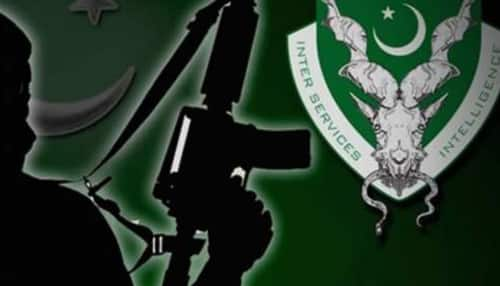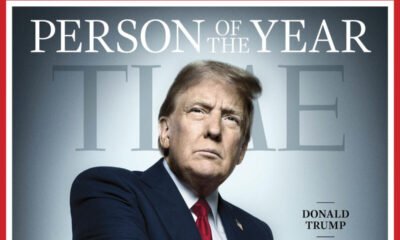Politics
Meeting That Has India Spooked, George Soros Son And Muhammad Yunus. The Growing Nexus Bangladesh-Pakistan Spells Trouble For India?
Published
6 months agoon

Alex Soros, the son of billionaire philanthropist George Soros, recently met with Muhammad Yunus in Dhaka. Reports indicate that their discussions focused on Bangladesh’s economy and proposed economic reforms. Notably, this development takes place against the backdrop of U.S. President Donald Trump freezing all foreign financial aid, including assistance to Yunus’ interim government in Bangladesh.
Growing Concerns in India
This meeting, the second in recent months between Soros and Yunus, has India watching as it has the probability to raise significant concerns for India, especially given the political and economic implications of their discussions.
Therefore, the question is, what transpired during the meeting, and what could come next?
According to recent reports, Alex Soros, who chairs the Open Society Foundations (OSF), met Yunus and expressed his commitment to supporting the interim government’s reform initiatives and spoke about the student movement, which led to Sheikh Hasina’s ousting last August, stating it presented “great opportunities” to steer Bangladesh towards a new path.
Accompanying Soros was a delegation that included OSF President Binaifer Nowrojee.
Local media reports indicate that the discussions also covered key issues such as cybersecurity, the Rohingya refugee crisis, and media freedom in Bangladesh. Reports also indicate that Soros praised Yunus for assuming leadership during a challenging period and for implementing much-needed reforms.
Yunus Seeks OSF Support From Alex Soros
Yunus is reportedly said to have expressed gratitude for OSF’s backing and addressed the widespread disinformation surrounding the protests against the previous Hasina regime and sought OSF’s assistance in recovering approximately $234 billion that was allegedly siphoned out of Bangladesh during Hasina’s tenure.
Yunus stated that the current focus is on rebuilding Bangladesh’s economy, tracing and repatriating illicit funds, countering misinformation, and implementing critical economic reforms.
The Chief Adviser’s office also acknowledged the meeting, stating on social media, “The Open Society Foundations leadership on Wednesday met the Chief Adviser to discuss Bangladesh’s efforts to rebuild the economy, trace siphoned-off assets, combat misinformation, and carry out vital economic reforms.”
Second Meeting Between Alex Soros and Yunus
It should be noted that this marks the second meeting between Soros and Yunus since Hasina’s removal from office in August. Their previous meeting took place on October 2, 2024, in New York.
Following that meeting, Alex Soros shared photos on Instagram, referring to Yunus as “an old friend of my father.” He wrote,
“Delighted to see an old friend of my father and the foundation, Nobel Prize winner @professormuhammadyunus, interim leader of Bangladesh, who stepped in to lead Bangladesh towards a peaceful future based on equity and fairness.”
Friendly Ties
Yunus and Soros share a history spanning decades. In 1999, Yunus secured an $11 million loan from the OSF-backed Soros Economic Development Fund, enabling Grameen Telecom—a non-profit associated with Yunus—to acquire a 35% stake in Bangladesh’s leading telecom operator, Grameenphone Ltd.
In December 2024, former OSF President Mark Malloch-Brown also met Yunus in Dhaka. A photo from the meeting was shared by Yunus’ office on X, with the caption, “Lord Mark Malloch-Brown calls on Chief Adviser Bangladesh.”

Rising Concerns For India
India is viewing these developments with apprehension. George Soros has been an outspoken critic of Indian Prime Minister Narendra Modi, and the OSF has been accused of supporting movements advocating for an independent Kashmir.
Despite Soros receiving the highest civilian award in the U.S. from former President Joe Biden, he remains a controversial figure. Indian External Affairs Minister S. Jaishankar previously described Soros as “old, rich, and dangerous.”
During the Adani controversy, Soros had stated that the developments could “significantly weaken” Modi’s “stranglehold” on the Indian government.
At the time, Indian Union Minister Smriti Irani accused Soros of attempting to undermine India’s democratic framework, stating, “India has always defeated foreign powers whenever it was challenged and will continue to defeat them in the future too.”
Alex Soros, OSF’s Role in Global Politics
OSF has been linked to regime changes in Eastern Europe, West Asia, and Latin America. Some analysts speculate that OSF played a role in Hasina’s downfall. While Hasina herself pointed fingers at the U.S., she did not provide specific details. However, a U.S. State Department official dismissed such allegations as “absolutely false,”.
However, with OSF funds potentially flowing into Bangladesh, the country’s political and economic trajectory could shift significantly.
Border Agreements with India Under Review
Adding to the concerns, Bangladesh’s interim government recently announced plans to reassess certain agreements with India. The issue is set to be discussed during a meeting between the Directors General of the border guards of both nations next month.
Home Adviser Lt. Gen. (Retd.) Md Jahangir Alam Chowdhury stated, that discussions will likely be held over all sorts of border-related agreements with India.
He further noted that Bangladesh intends to seek the cancellation of certain “uneven agreements” related to border management and address other bilateral issues.
BJP’s Allegations
Meanwhile, Bharatiya Janata Party (BJP) has accused Congress leader Sonia Gandhi of having links with organizations funded by Soros. In Parliament, BJP leaders alleged, that the association between Sonia Gandhi and an organization that has backed the idea of Kashmir as an independent nation expresses the influence of foreign entities on India’s internal affairs and the political impact of such connections.

The Growing Bangladesh-Pakistan Connection
Meanwhile, a recent visit by a Bangladeshi military delegation to Pakistan has raised eyebrows in New Delhi, but what followed has set off even bigger alarm bells—Pakistan has reportedly sent four senior ISI officials to Bangladesh.
This unexpected closeness between Dhaka and Islamabad is being closely watched by India, with the Ministry of External Affairs (MEA) confirming that they’re keeping tabs on the developments. MEA Spokesperson Randhir Jaiswal reassured that the Indian government is staying vigilant and will take necessary action to safeguard national security.
The ISI delegation, led by Maj Gen Shahid Amir Afsar (Director General of Analysis), arrived in Dhaka just days after the Bangladeshi military delegation returned from Pakistan. The timing is no coincidence. The Bangladeshi team, headed by Lt Gen SM Kamrul Hasan, had engaged in high-level discussions with Pakistan’s top military brass, including Army Chief Gen. Asim Munir, between January 13–18.
Then, on January 21, Pakistan quietly sent its intelligence officials to Dhaka—the first such official ISI visit to Bangladesh in nearly two decades. The team flew in from Dubai and was received by Bangladesh’s intelligence agency, DGFI.
Naturally, India isn’t thrilled about this growing interaction between its two neighbors. While India and Bangladesh have historically shared strong ties, recent political shifts in Dhaka have made the situation a little shaky. But despite this, India is keen to keep a strong relationship.
The India-Bangladesh dynamic has been somewhat strained ever since Prime Minister Sheikh Hasina was ousted in August last year amid large-scale protests. Under the interim administration led by Muhammad Yunus, tensions have only grown, especially with rising violence against minorities, particularly Hindus, in Bangladesh. The latest diplomatic shifts, combined with Pakistan’s increasing engagement, are making things even more complicated for India.
ISI Becomes Active After Sheikh Hasina’s Exit
During Sheikh Hasina’s tenure as Prime Minister, Pakistan’s ISI activities were strictly curtailed in Bangladesh. The agency’s covert operations and political interference were identified as sources of instability in the region. Under Hasina’s leadership, Bangladesh arrested and prosecuted several individuals suspected of colluding with ISI. However, her departure has led to a revival of military ties between Bangladesh and Pakistan, raising fresh concerns for India.
Historically, ISI has played a detrimental role in India’s security, often being linked to terrorist activities, infiltration, and insurgency support. In the 1990s, Pakistan was a hub for terrorist camps, and ISI used Bangladeshi soil to facilitate insurgencies in India’s northeastern states. Hasina, during her first tenure in 1996, took stringent actions to end this misuse of Bangladesh’s territory. However, with the new interim administration led by Muhammad Yunus, old fears of ISI’s involvement in destabilizing India have resurfaced.
Alex Soros’ Entry into the Equation—A New Dimension of Influence
Now, further complicating matters is the increasing involvement of Alex Soros, son of billionaire philanthropist George Soros. His visit, coupled with growing Pakistan-Bangladesh ties, indicates an evolving geopolitical shift that India must prepare for. If OSF channels funds into Bangladesh under the pretext of economic reforms while indirectly supporting ISI-linked entities, India could face increased cross-border security threats, misinformation campaigns, and destabilizing narratives targeting its governance.

So what should India look out for?
—Increased ISI Activity – With ISI gaining a renewed foothold in Bangladesh, India may see a rise in espionage, terror infiltration, and funding of anti-India activities, especially in the Northeast.
—Economic and Political Influence – OSF’s involvement in Bangladesh could lead to strategic investments that challenge India’s regional influence, especially if Soros-backed organizations shape Bangladesh’s policies.
—Border Security Challenges – With Bangladesh reviewing its border agreements with India, there could be increased tensions and new disputes over border management and security cooperation.
—Rise in Misinformation – ISI and OSF-backed groups could escalate disinformation campaigns aimed at destabilizing India’s internal stability, leveraging social media and international advocacy groups.
The Last Bit
India must remain proactive in strengthening its diplomatic ties with Bangladesh while keeping a close watch on the evolving geopolitical arena. Counter-intelligence operations need to be ramped up to detect any ISI-backed activities, while economic cooperation with Bangladesh should be reinforced to prevent external influences from gaining undue leverage.
Furthermore, India must engage on an international level to expose and counteract any OSF-backed efforts that seek to undermine its sovereignty. Given the historic role of ISI in promoting anti-India insurgencies and George Soros’ well-documented involvement in political interventions worldwide, India cannot afford to take these developments lightly.
In an era where geopolitical strategies are dictated by both financial and intelligence networks, India’s vigilance and strategic response will determine the future stability of the subcontinent.
So, what does this all mean? While nothing is set in stone, India will likely tread carefully while keeping its security priorities front and center. A closer Bangladesh-Pakistan relationship isn’t ideal for India, but as always, New Delhi will be watching—and acting—where needed.
You may like
-


Germany’s Friedrich Merz’s Big Balancing Act—Trump, Borders & Europe’s Future. Can He Deliver?
-


Why Are Japanese Companies Not Happy With Trump? How Trump 2.0 Is Shaking The World Into A ‘Rude’ Awakening?
-


Trump Blames Zelenskyy For Russia-Ukraine War As Peace Talks Sideline Kyiv. EU $6.2 Billion Military Aid Package For Ukraine—What’s The Real Plan?
-
India Cuts Tariffs On US Bourbon! But Do Trump’s Retaliatory Tariffs Mean Cheaper American Goods For Indian Consumers?
-


Will Ukraine Get A Raw Deal Despite 3 Years Of War? Trump-Putin Alliance Puts Zelenskyy In A Corner, While Europe Senses Trouble—Can Europe Stop This?
-


All You Need To Know About The New Income Tax Bill 2025, Debuts With A New Concept Of ‘Tax Year’. A Meaningful Change Or Just A Facelift?
